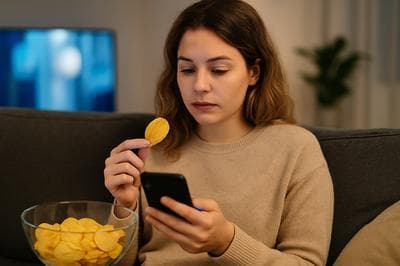Mindless eating,especially while watching TV, scrolling your phone, or working, is incredibly common. But eating while distracted often leads to overeating, poor food choices, and a weaker connection to hunger and fullness signals.
This guide explores the causes of distracted eating, how it affects your health and habits, and what you can do to bring more awareness and balance back to mealtimes.
This article also explains how weight loss medications like Mounjaro and Wegovy can help overcome the habit of mindless eating. Use the links here for a free online eligibility assessment, or find out more about our medications.
